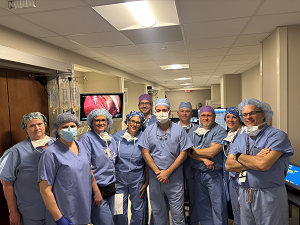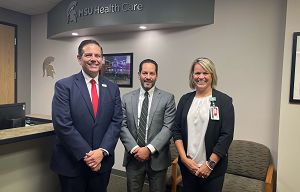Henry Ford Cardiologists Find Apple iPhone 12 Magnet Deactivates Implantable Cardiac Devices

DETROIT (February 4, 2021) – One of the newest features of the Apple iPhone 12 series of mobile devices is a strong magnet that helps align the phone on Apple’s MagSafe accessory to maximize charging – a feature that raised the curiosity of Henry Ford Heart & Vascular Institute cardiologist Gurjit Singh, M.D., and his colleagues.
Dr. Singh is an expert in cardiac electrophysiology, a specialty which deals with various electrical and rhythm disorders. He is an expert in the use of devices such as implantable defibrillators that detect an irregular heartbeat and shock the heart back into a normal rhythm, and pacemakers that use electricity to keep the heart beating. Combined, more than 300,000 people in the United States undergo surgery to implant one of these devices each year. Additionally, approximately one in four cell phones sold last year was an iPhone 12.
These cardiac devices have switches which respond to an external magnet to change how the device functions. For a defibrillator, a magnet can be used to turn the device off. For a pacemaker, a strong magnet can make the device deliver electrical impulses that cause the heart to beat out of sync, which can bring about a potentially lethal condition called ventricular fibrillation.
“Obviously, we can’t perform surgery every time we need to control one of these devices, which is why they are engineered to allow us to use strong magnets over the chest to control their function,” said Dr. Singh. “So, we began to wonder if the magnet in the iPhone 12 would affect the safe operation of these devices.”
In order to find out if their suspicions were true, Dr. Singh and his colleagues took an iPhone 12 Pro and passed it over the chest of a patient with an implantable defibrillator.
“When we brought the iPhone close to the patient’s chest the defibrillator was deactivated,” said Dr. Singh. “We saw on the external defibrillator programmer that the functions of the device were suspended and remained suspended. When we took the phone away from the patient’s chest, the defibrillator immediately returned to its normal function.”
“We were all stunned,” he said. “We had assumed that the magnet would be too weak in a phone to trip the defibrillator’s magnetic switch. “

Alarmed by their discovery, Dr. Singh and his Henry Ford colleagues immediately drafted a manuscript about their findings and submitted it to the medical journal HeartRhythm, which was published on January 4, 2021. The findings got the attention of the FDA, which regulates medical devices, the Association for the Advancement of Medical Instrumentation, and most notably, Apple itself, which published a warning on its webpage on January 23.
“We believe our findings have profound implications on a large scale for the people who live daily with these devices, who without thinking, will place their phone in their shirt pocket or upper pocket or their coat – not knowing that it can cause their defibrillator or pacemaker to function in a way that could potentially be lethal.”
Dr. Singh and his colleagues at Henry Ford are preparing to launch a more comprehensive study of all major brands of defibrillators and pacemakers to determine if they are also affected by the strong magnets in the iPhone 12 and other portable devices.
In the meantime, Dr. Singh says anyone with an iPhone 12, or phones with magnetic cases and devices containing magnets should keep it at least 6 inches away from their chest at all times. Apple has issued the same warning. And the FDA is now conducting its own tests on the risk these magnets pose to defibrillator and pacemaker patients.
###
About Henry Ford Health System Founded in 1915 by Henry Ford himself, Henry Ford Health System is a non-profit, integrated health system committed to improving people’s lives through excellence in the science and art of healthcare and healing. Henry Ford Health System includes six hospitals including Henry Ford Hospital in Detroit; Henry Ford Macomb Hospitals; Henry Ford Wyandotte Hospital; Henry Ford West Bloomfield Hospital; Henry Ford Allegiance in Jackson, MI; and Henry Ford Kingswood Hospital – an inpatient psychiatric hospital.
Henry Ford Health System also includes Henry Ford Medical Group: Henry Ford Physician Network; more than 250 outpatient facilities; Henry Ford Pharmacy; Henry Ford OptimEyes; and other healthcare services. Our not-for-profit health plan, Health Alliance Plan – HAP – provides health coverage for more than 540,000 people.
As one of the nation’s leading academic medical centers, Henry Ford Health System trains more than 3,000 medical students, residents, and fellows annually in more than 50 accredited programs, and has trained nearly 40% of the state’s physicians. Our dedication to education and research is supported by nearly $100 million in annual grants from the National Institutes of Health and other public and private foundations.
Henry Ford Health System employs more than 33,000 people, including more than 1,600 physicians, more than 6,600 nurses and 5,000 allied health professionals. For more information, go to henryford.com.
NEWS MEDIA ONLY may contact: John Gillespie / jgilles3@hfhs.org / 314-708-9090 David Olejarz / David.Olejarz@hfhs.org / 313-303-0606
.svg?iar=0&hash=F6049510E33E4E6D8196C26CCC0A64A4)

/hfh-logo-main--white.svg?iar=0&hash=ED491CBFADFB7670FAE94559C98D7798)









